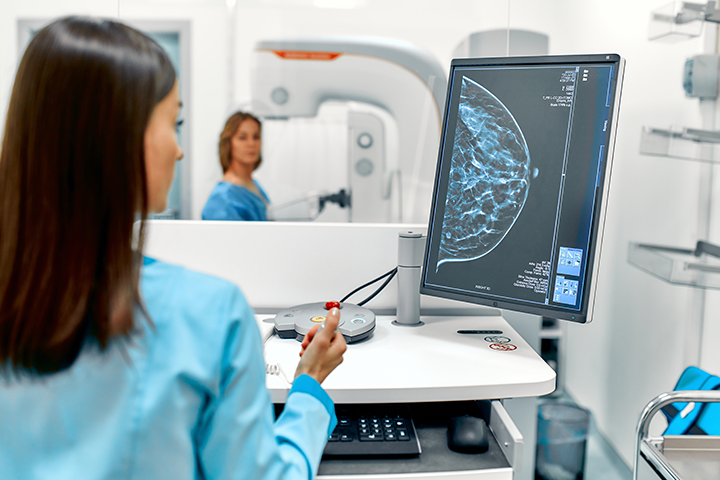Breast cancer is one of the most common types of cancer in women. In fact, one in eight women will be diagnosed with breast cancer at some point in their lives. With about 280,000 new cases in the U.S. each year, it’s never been more important for you to understand your risks and what you can do to prevent the onset of breast cancer.
Are You at Risk?
While some women may be more at risk than others, everyone faces the risk of getting breast cancer.
Your risk of breast cancer increases if you:
- are age 50 or older
- have a mother, sister or daughter who has had breast cancer
- started your period before age 12
- started menopause after age 55
- had your first child after age 30
- have no children
- are overweight or obese after menopause
- had a biopsy showing abnormal changes
- had breast cancer before
Women who have a family history of breast cancer, ovarian cancer, dense breasts, or certain genetic mutations are also at greater risk of breast cancer. Other factors, such as smoking and drinking alcohol, can also increase your risk.
Although breast cancer is mostly found in women, 1 out of 100 men can get diagnosed with breast cancer in their lifetime.

Know the Symptoms
Symptoms of breast cancer can vary among people. You may not show any signs. See your doctor right away if you notice these warning signs:
- lump or node in your breast or armpit
- swelling or redness on part of your breast
- irritation or dimpling of your breast skin
- peeling or flaky skin in your nipple area or your breast
- any nipple discharge other than breast milk
- change in the size or the shape of your breast
- pain in any part of your breast
- thickening on or near your breast
- change in the color or texture of the skin on or around your breast
Get Screened
Finding breast cancer early is important. More than 42,000 women in the U.S. die each year from breast cancer. Don't take any chances. Talk to your health care provider about breast cancer, your risk factors and your family medical history.
Recommendations for women at average breast cancer risk:
- If you're between the ages of 40 and 44, you have the option to get a mammogram every year.
- If you're between the ages of 45 and 54, get a mammogram every year.
- If you're 55 and older, get a mammogram every other year or continue to get one every year.
For TRS-ActiveCare participants, we have a short video you can watch about how-to get a mammogram.
TRS-ActiveCare and TRS-Care Standard plans cover 100% of your annual wellness exam with your OB-GYN or Primary Care Provider. Routine annual mammograms for women 35 and over are also covered. Tell your doctor about your risk factors to find out if you should get mammograms more often.
What can you do?
You can't change your family history, but there are many ways to help prevent breast cancer. Start with what you can control.
- Get a regular checkup. Early detection can save your life. Your routine mammogram or well-woman exam can help spot a potential problem sooner.
- Develop healthy habits. Limit alcohol and eat low-fat foods and lots of fruits and vegetables.
- Maintain a healthy weight. Aim for at least 150 minutes of aerobic activity, like walking or cycling, weekly.
- Don't smoke or use tobacco. When it comes to cancer, tobacco is still one of the largest risk factors.
- Get familiar with your breasts. Knowing how your breasts look and feel can help you notice symptoms that may be of concern. Learn how to give yourself a breast self-exam. Breast self-exams shouldn't be used as a replacement for a visit with your PCP or OB-GYN.

Resources for TRS-ActiveCare and TRS-Care Standard
Provider Finder®
If you need help finding a PCP or OB-GYN, our Provider Finder® lets you search for providers using location, patient reviews, certifications and more. A Personal Health Guide can also help you find a provider and schedule an appointment. They're available 24/7 at 1-866-355-5999, or you can chat through the BCBSTX App.
Well onTarget®
If you need help making healthy lifestyle changes, you can work with a wellness coach at no added cost with Well onTarget.® They can help you focus on your fitness, nutrition, weight loss, quitting smoking and more.
The Well onTarget program is offered to you as a part of your employer-sponsored benefits. Participation in the Well onTarget program, including completing a Health Assessment, is voluntary, and you are not required to participate. Visit Well onTarget for complete details and terms and conditions.
Resources for TRS-Care Medicare Advantage
Screenings Coverage
Screenings are important. Fortunately, your TRS-Care Medicare Advantage plan provides coverage for various cancer-related screenings and health care services. How each screening is covered and how often you can get them vary. Coverage may also be dependent on you meeting specific conditions. For questions about how your breast cancer screening is covered or for help finding a provider call UnitedHealthcare at 1-866-347-9507, TTY 711, 7 a.m.–6 p.m. CT, Monday–Friday.